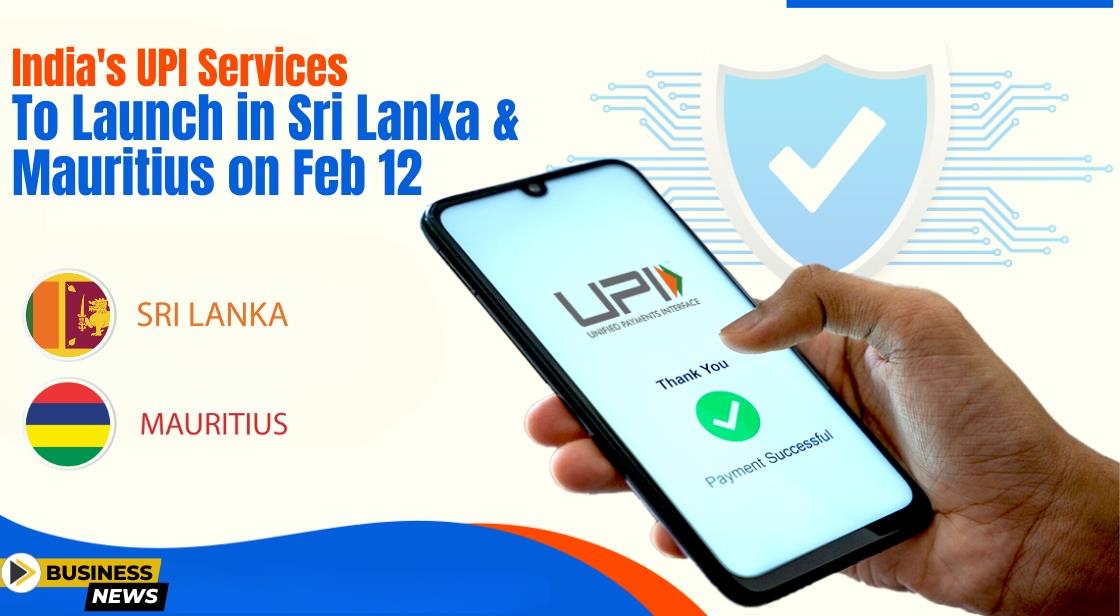India's UPI Services Extend Global Reach, Set to Launch in Sri Lanka and Mauritius on Feb 12

News Synopsis
India's Unified Payments Interface (UPI) is poised for expansion as it gears up to launch its services in Sri Lanka and Mauritius on February 12. This significant move adds to the growing list of countries where the Indian payments system is gaining acceptance or being linked to their own fast-payments network.
Expanding Horizons: UPI Launch in Sri Lanka and Mauritius
The launch event, scheduled for February 12 at 1 PM, will witness the presence of Prime Minister Narendra Modi, Sri Lanka President Ranil Wickremesinghe, and Mauritius Prime Minister Pravind Jugnauth via video conferencing. Joining them will be the respective central bank governors, highlighting the importance of this cross-border initiative.
Inclusive Digital Connectivity
The Indian government, in a statement released on February 11, emphasized the significance of this launch in fostering digital connectivity between India, Sri Lanka, and Mauritius. With robust cultural and people-to-people linkages, the extension of UPI services and RuPay card facilities aims to enhance the digital transaction experience for a wide cross-section of individuals.
Benefits for Travelers
The launch of UPI services in Sri Lanka and Mauritius holds particular significance for travelers. Indian nationals visiting these countries and Mauritian nationals traveling to India will now have access to seamless UPI settlement services, streamlining their digital payment experiences.
RuPay Card Expansion
In addition to UPI, the launch event will also mark the introduction of RuPay card services in Mauritius. This expansion will enable Mauritian banks to issue RuPay cards locally, facilitating card-based settlements both in India and Mauritius.
Global Outreach of Indian Payments Systems
India's efforts to promote the use of its currency and payments systems globally have been evident over the past few years. The Reserve Bank of India (RBI) announced a mechanism for settling global trade in rupees in July 2022. Moreover, strategic collaborations such as linking the UPI with UAE's Instant Payment Platform and partnering with Singapore's fast payments system PayNow underscore India's commitment to expanding its digital footprint internationally.
Beyond UPI: RuPay Cards Arrive in Mauritius
Apart from UPI, Mauritius will also welcome the launch of RuPay card services. This enables Mauritian banks to issue RuPay cards, allowing cardholders to make secure and convenient payments in both India and Mauritius.
Benefits for All: Seamless Transactions and Stronger Connections
The Indian government emphasizes the significant benefits of this launch:
-
Enhanced digital connectivity: Smoother cross-border transactions will strengthen economic and cultural ties between India, Sri Lanka, and Mauritius.
-
Seamless digital experience: Tourists and citizens from all three countries can enjoy faster and more convenient cashless transactions.
-
Wider reach for Indian payment systems: This expansion reinforces India's efforts to promote the international use of rupee and its digital payment infrastructure.
India's Growing Global Payment Footprint
This launch follows a series of strategic moves by India to expand the reach of its payment systems:
-
July 2022: RBI announces a mechanism for settling global trade in rupees.
-
July 2023: India inks an MoU to link UPI with UAE's Instant Payment Platform.
-
February 2023: India and Singapore link UPI with Singapore's PayNow.
-
Ongoing discussions: Talks are underway with Indonesia, Latin American, and African countries for similar collaborations.
Looking Ahead: A More Connected Future
The launch of UPI in Sri Lanka and Mauritius, coupled with the introduction of RuPay cards in Mauritius, represents a significant step towards a more interconnected financial landscape. This initiative has the potential to facilitate trade, tourism, and people-to-people exchanges, paving the way for a brighter and more integrated future for the participating nations.
By extending its payments infrastructure to international shores, India is not only enhancing digital connectivity but also fostering greater financial inclusion and convenience for travelers across borders.
You May Like









